Who pulled the trigger? Questions raised after Georgia police officer says his wife fatally shot herself
This story originally aired on Jan, 28. It was updated on Nov. 18.
Just an hour-and-a-half after Seth Perrault said his 44-year-old wife, Amanda, shot herself right in front of him, he was struggling to tell his story.
SETH PERRAULT (to Sheriff Howard Sills): I'm in shock. My wife of eight years, that I love more than anything in this world…
SETH PERRAULT (to Sheriff Sills): I don't know even where to start, sir. … I've lost everything in my life.
Perrault, 44, then a police officer for the City of Eatonton, Georgia, told Putnam County Sheriff Howard Sills that his wife Amanda had shot herself in the head.
Anne-Marie Green| "48 Hours" contributor: What did he say happened?
Sheriff Howard Sills: He said that they were in bed and … they were arguin' … And then all of a sudden, she just produced the gun outta thin air and executed herself.
SETH PERRAULT (to Sheriff Sills): I just sat there and watched my wife execute herself.
Sheriff Howard Sills: In all my years of questioning anybody for … suicide … I have never heard anybody use the term "executed."
Angie Johnson: I knew she hadn't. I knew that he was lying.
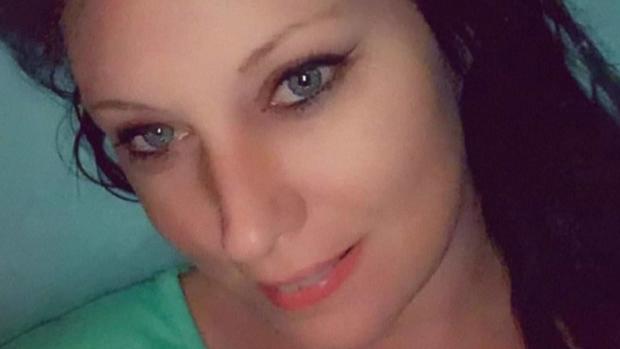
From the very beginning, Angie and Alesha Johnson say they had questions about what happened to their sister Amanda.
Alesha Johnson: We knew better. We knew our sister. … Amanda loved life.
Angie Johnson: She wouldn't put us through this.
About eight years earlier, in the fall of 2011, a recently divorced Amanda met Seth Perrault online.
Alesha Johnson: I remember her being kind of excited about it. … he treated her differently from some of the past relationships she had been in where, you know, she wasn't respected.
Seth, battling cancer and unemployed at the time, seemed to fall for Amanda fast and hard.
Angie Johnson: And they moved in fairly quick. Like, he had her move in within six months of them meeting.
Seth was living an hour away, with his mother, who was caring for him. But Angie says Amanda would quickly take over the role of Seth's caretaker.
Angie Johnson: When she moved out there … he didn't want her to work.
They say Seth's parents were paying all of the couple's bills – and helping with expenses for Seth's daughter from a previous relationship.
Anne Marie Green: So, Seth was basically dependent on his family?
Alesha and Angie Johnson: Very much.
And Amanda was dependent on Seth.
Angie Johnson: For the longest time, like, he wouldn't let her have any kind of … phone, cell phone or anything like that … It would be his phone or a landline.
Sheriff Howard Sills: She didn't even have a car to drive. He monitored her constantly.
As time went on, Alesha and Angie say they saw less and less of their sister.
Angie Johnson: He kept us from bein' able to see her.
Alesha Johnson: She didn't come to, like, any of our Christmas events, or like, any of our events because she had to host for his family and cook for all of them.
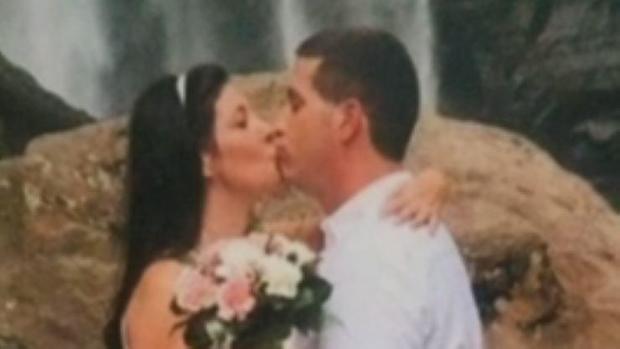
Amanda lived with Seth for five years. Then, on June 23, 2017, the couple surprised everyone when they quietly went to the local courthouse and got married. Angie and Alesha believe the only reason Seth married their sister was to help him get custody of his daughter.
Alesha Johnson: That's why I feel like he asked her to marry him.
Seth's custody battle had been going on for almost exactly a year at that point.
Anne-Marie Green: Do you think Seth marrying Amanda helped him gain custody?
Justin Kenney: Absolutely.
Seth's attorney, Justin Kenney is Seth's attorney.
Justin Kenney: If Amanda was going to be present in his daughter's life they had to get married … I think that was one of the paramount issues for him to gain custody.
Kenney says Seth did love Amanda—and his daughter—and was just trying to do what he thought was best for everyone.
Justin Kenney: This was a guy that doted on his daughter. He was a family man. … he would dote on his wife. … I just thought he was a — a stand-up individual.
A few months after Amanda and Seth were married, he was granted custody of his daughter. A little over year later he was hired by the Eatonton Police Department, and his father bought him a house near Lake Oconee.
Alesha Johnson: She loved their new home.
Anne-Marie Green: This should have been everything she hoped for.
Alesha Johnson: Yeah, it was. You know, except for the relationship.
Alesha and Angie say they didn't know just how bad things had gotten, but were hearing more and more stories of fighting, fueled by alcohol.
Justin Kenney: I've heard stories and interviews that, you know, when they were sober, they were loving toward one another. But it's when alcohol came into the mix … that's when it became toxic.
A little over a year after joining the police force, Seth fell down some stairs at the couple's home and had to go on medical leave. Now, along with the alcohol, there were pain pills, and the sisters say the fighting seemed to be escalating.
Angie Johnson: You could hear it, like, on phone calls.
Alesha Johnson: His tone and demeanor around her.
Angie Johnson: I would ask. … "do you want me to call 911? Can I call 911?"
Alesha Johnson: She would tell you, "No, no, don't call." You know, "We've just been drinkin'. We'll be — everything'll be OK later on." … Maybe she knew her situation would become even worse, you know.
Then, things did get worse. On Jan. 28, 2020, just days before her death, Amanda called 911.
911 DISPATCHER: Putnam County Sheriff's Office will you hold please?
AMANDA PERRAULT: Yes, thank you.
Angie Johnson: She had barricaded herself in … a back bedroom.
AMANDA PERRAULT (911 call): It's my husband, and he's putting his hands on me.
Angie Johnson: She ended up havin' to run next door.
AMANDA PERRAULT (911 call): He locked me out of the house and I'm just trying to get my things out of the house, please.
911 DISPATCHER: She's at the neighbor's house right now.
Another sheriff's dispatcher was alerted.
SECOND 911 DISPATCHER: And she said her husband is … an officer with the Eatonton Police Department.
That second dispatcher said he knew Seth Perrault and said he had a reputation.
SECOND 911 DISPATCHER: I ain't supposed to know this … but he's been out of work with his back and apparently, he's over their whoopin' up on her ass.
Seth made local headlines when he was arrested on charges of simple battery and family violence.
Angie Johnson: She … told me … would I come get her the next mornin'? And I told her yes, to make sure to pack everything, have it ready.
Instead, Amanda decided to attend Seth's bond hearing. When the judge agreed to release Seth on bail, he asked Amanda if she wanted a "stay away" order added. Amanda said no, and then let Seth come home.
Alesha Johnson: 'Cause she was scared. … She knew he was mad, she knew that it was … public that he had been arrested. "He's a police officer … You know, I have to bring him home and make this right."
Alesha Johnson: I talked to her the day he got out. And … I said, "How are things?" And she said, "He's bein' unusually nice."
Alesha says she doubted Seth's new attitude and felt that underneath he must be seething —knowing that if he was convicted on abuse charges, he was in danger of losing custody of his daughter and his job.
Alesha Johnson: He knew it was gonna embarrass his family … And he had already put himself up here on this pedestal like he was king. And then to be humiliated in front of people … I think it made him very angry.
Alesha says Amanda was terrified and looking for a way out.
Alesha Johnson: We were all on — a chain message … and we were tellin' her, "Just get out … divorce him, tell his father that you don't want anything but a vehicle." … And … she said, "I'm not trying to get killed."
Just five days later, Amanda was dead.
QUESTIONS RAISED
Sheriff Howard Sills says that from the very start of his investigation into the death of Amanda Perrault, he wasn't buying her husband's story.
Sheriff Howard Sills: I knew somethin' was wrong the day I walked in the house.
For starters, the position of Amanda's body — depicted below in a "48 Hours" animation based on the crime scene photos — left Sills certain that Amanda could not have shot herself.
Also of concern to Sills was the way the Smith and Wesson .380, which belonged to Seth, was found lying next to Amanda's body with its magazine ejected
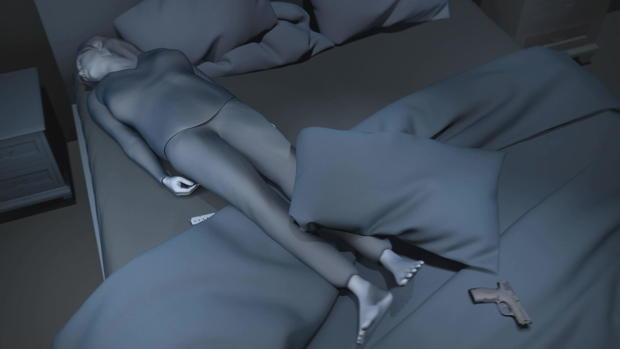
Sheriff Howard Sills: The magazine … It was … near her right side, and the pistol itself, was way down here below her left foot.
What made the ejected magazine even more curious says Sills, is the fact that there was a bullet found inside the gun's chamber.
Sheriff Howard Sills: It's a semiautomatic gun. So, when it fires … the slide comes back. The spent cartridge casin' is ejected, and it picks up the next round.
Because of that bullet in the chamber, the magazine had to be ejected after the gun was fired, says Sills. And, unless the gun is defective, the only way to eject the magazine is to push the button.
Sheriff Howard Sills: Now, don't do this at home. But when you do this (puts gun to his right temple) how you gonna get your hand — your second hand around there to do it (reaches around with his left hand to try and reach the button)?
There was also no blood on Amanda's hands or the long sleeves of her shirt. And something else caught the sheriff's eye.
Sheriff Howard Sills: In the middle of the closet on the floor was a damp green towel … Somebody had dried off with it, no doubt about that.
One of the first deputies on the scene said Seth smelled like shampoo. Also alarming, the bedroom was littered with 20 miniature bottles of Fireball Whiskey — all of them empty. Sills says he didn't have the manpower to process the scene, so he called in agents from the Georgia Bureau of Investigation. While they collected physical evidence and Amanda's body was transported to the state medical examiner, Sills focused on Seth.
Sheriff Howard Sills (in his office): He came in and sat right in this blue, leather chair.
Seth spoke to Sills in his office for over an hour without an attorney present.
SETH PERRAULT: I'm not gonna lie to you. I'm — I have no reason to lie to you.
Sheriff Howard Sills: I wanted to know what had happened that day. … how did the magazine get outta the gun? … How did the gun get where it was?
SHERIFF SILLS: Did you touch that gun today?
SETH PERRAULT: The .380?
SHERIFF SILLS: Yeah.
SETH PERRAULT: I mean, it's been, like — no.
SHERIFF SILLS: Today?
SETH PERRAULT: No, sir.
Anne-Marie Green: How does her body get into that position —
Sheriff Howard Sills: He … No answer.
Anne-Marie Green: — because he never touched her?
Sheriff Howard Sills: No, never touched her.
But Sills says that didn't make any sense, so he kept pressing. And then, Seth changed his story.
SHERIFF SILLS: Did you touch her?
SETH PERRAULT: Maybe I d — I don't know … I probably did touch her. I was probably huggin' the s*** out of her. And I was probably like, I'm so — like, "honey. What the hell's going on?"
Sheriff Sills says Seth tried several times to deflect questions with his badge.
SETH PERRAULT: I take pride in being a good law enforcement agent.
Sheriff Howard Sills: I can't remember how many times he looked me in the eye and said, "I'm a good police officer."
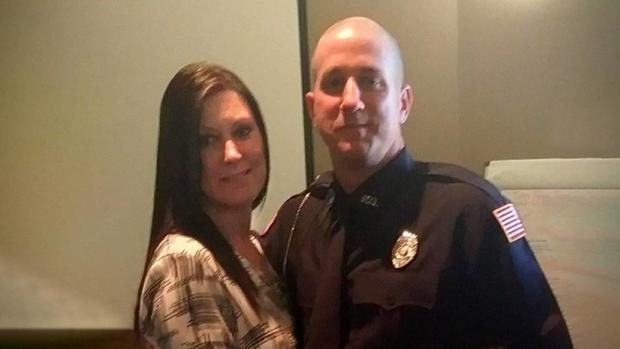
Amanda, he said, also knew what a good cop he was, and how assault charges would ruin both their lives.
SETH PERRAULT: She h — hated to see my reputation destroyed on the news 'cause she knows what a good police officer I am. … And she was so worried I'd lose my daughter. … She wanted to come down here and tell you that it was a lie.
Seth insisted that Amanda had lied the day she called 911 and felt so bad about it that she wanted to confess to perjury.
Sheriff Howard Sills: He said that she had written something that she intended to bring to me, recanting what she had told the deputies. And he told me where it was.
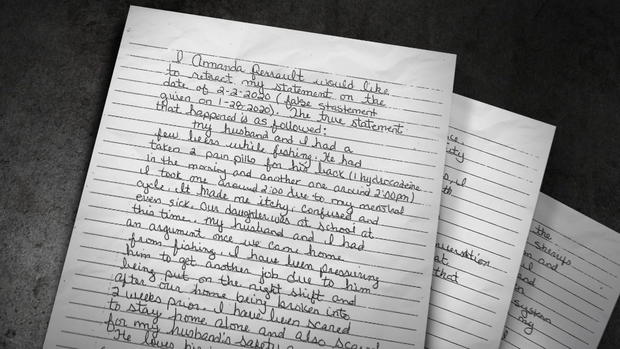
A handwritten letter was found in Amanda's nightstand. It reads in part:
"I Amanda Perrault would like to retract my statement … My husband never put his hands on me ever. I feel horrible for the humiliation I have put my husband and my family through. I am willing to take any punishment I may deserve for what I have done."
Sheriff Howard Sills (shows Green the letter): I don't deny she wrote it. But look at the penmanship. There's not the slightest error of any kind.
Sheriff Howard Sills: What we've got here is an inexperienced police officer dictating what's to be written.
Like Sills, Amanda's sisters are certain Seth was behind the letter.
Angie Johnson: She wrote it, but she was coached. … I think what he was telling her — "I need you to write this to get me out of trouble."
But Seth told Sills he was not about to let Amanda confess to lying to authorities.
SETH PERRAULT (to Sheriff Sills): I knew if she came down here, it was a false statement and a felony. I knew it.
But according to Seth, Amanda couldn't take the guilt anymore, so she put his gun to her head and pulled the trigger.
SETH PERRAULT (to Sheriff Sills): She looked at me and said, "I'm sorry. I'm sorry I put you through this." Boom. … I couldn't even say a word, Sheriff. It was done.
Seth tried to convince Sills that Amanda killed herself, because her call to 911 had potentially ruined their lives. But the sheriff didn't see that as a reason for suicide; instead, he saw a motive for murder. Believing that Amanda would never take her own life, this made sense to her sisters as well.
Alesha Johnson: He had to make it look like she took her life so that he could be cleared of all this wrongdoing.
Sheriff Sills says he was convinced that Seth Perrault was somehow involved in his wife's death, but that day, he felt he didn't have enough to arrest him.
Sheriff Howard Sills: I wanted to see if I could get some more evidence. And I did.
TROUBLING CLUES
One of the clues that convinced Sheriff Sills that Seth Perrault wasn't telling the truth were his actions just 20 minutes before he reported his wife Amanda was dead. That's when Sills' deputy, Terrell Abernathy, arrived at Seth's front door, trying to deliver paperwork on an upcoming case.
Deputy Terrell Abernathy: They had one of those video doorbell things, and I rang that.
The scene was captured on video.
Deputy Terrell Abernathy: I expected him to answer the door, and I expected him to hand him his copy of the subpoena … I mean, you're a policeman. You know how this works.
Abernathy says he could tell someone was home.
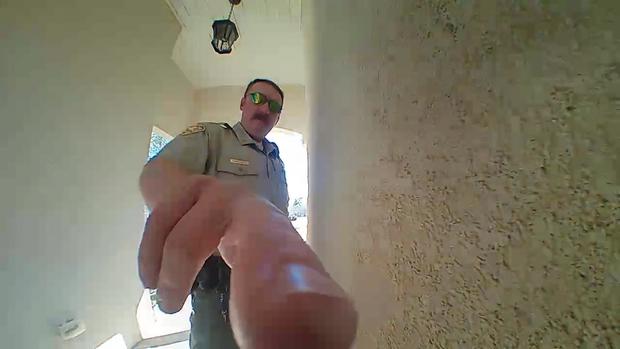
Anne-Marie Green: What'd you hear?
Deputy Terrell Abernathy: I heard footsteps or footfalls, heavy ones. … I'm announcing myself, who I am, what it is. I even turned my back to the door. … I don't care if you're in your underwear. Just answer the door and take the paper.
He waited seven minutes and then left — subpoena still in hand.
DA Wright Barksdale: In my heart, I believe that Amanda Perrault had already been shot when Abernathy rang the doorbell. … I think he was concerned that somebody heard the gunshot, and that's why he didn't go to the door.
District Attorney Wright Barksdale believes Seth was trying to figure out what to do next.
DA Wright Barksdale: Think about this: he's in the process of staging this scene, and he hears the doorbell ring. Can you imagine what was goin' through his mind?
But attorney Justin Kenney says that is not what happened.
Anne-Marie Green: Why didn't they come to the door when Deputy Abernathy rang that bell?
Justin Kenney: Fear of what he's bringing. … Seth is afraid that … his ex is about to serve him with custody modification paperwork.
Anne-Marie Green: What does Seth say happened after that?
Justin Kenney: So, I believe that there is a heated discussion that takes place. … He lays down … (to) diffuse the situation, he lays down to take a nap. … He awoke to Amanda mumbling something, whispering something … and— her pulling the trigger and shooting herself.
Kenney points out that Amanda was impaired by alcohol — three times the legal limit, when tested by the medical examiner. That and the escalating tension in her marriage, became a deadly combination.
Justin Kenney: The nice house … the daughter … the financial security, all of this was crumbling around Amanda. And then you tack on a .23 blood alcohol content … She thought that that was the only way to — to fix it, to — to end it.
Anne-Marie Green: She was really drunk.
Sheriff Howard Sills: Absolutely.
Anne-Marie Green: Maybe she accidentally shot the gun.
Sheriff Howard Sills: How'd she accidentally get the magazine out of it? … How'd she accidentally get posed as she was?
Sills was also very troubled because Seth didn't call 911 when his wife allegedly shot herself. Instead, Perrault called his boss, the Eatonton chief of police, on his cell phone. "48 Hours" made several unsuccessful attempts to reach the former chief of police for comment.
Sheriff Howard Sills: Obviously, we're not gonna have a recording of that. And they have at least a 20-minute conversation before I'm called.
Hoping the Perrault's neighbors had heard something the day Amanda died, Sills had Deputy Abernathy go back to the Perrault house to question them. What he learned made Sills even more suspicious about Seth's involvement in Amanda's death.
Sheriff Howard Sills: We found out that there had been a true pattern of domestic violence for years and years.
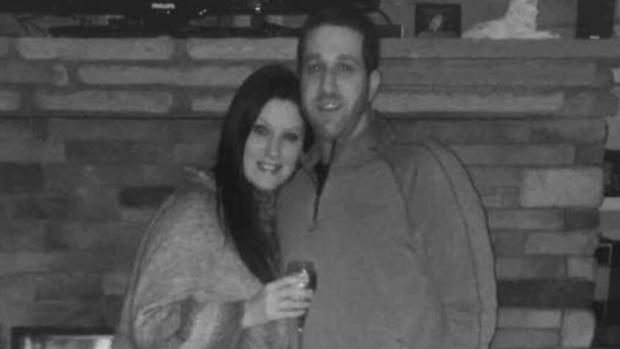
Neighbors said the couple could be heard fighting nearly every day. And in their eyes, Seth was almost always the aggressor.
DA Wright Barksdale: They told stories about a physical altercation between Seth and Amanda where he actually grabbed her by the back of the hair and pulled her down and pushed her into the driveway.
One neighbor told Abernathy that he would often stand by in case things got really violent.
Deputy Terrell Abernathy: He talked about how that at times he would just stand in the yard and just wait to see if he needed to call 911, because it was so violent over there.
Another neighbor said that Amanda had twice made this chilling comment:
Deputy Terrell Abernathy: That if she were to wind up dead … that Perrault is the one that did it, and … she made this neighbor promise … that she would insist that her death be investigated as a homicide.
Anne-Marie Green: Did anyone call the police?
Sheriff Howard Sills: No.
Anne-Marie Green: Why not?
Sheriff Howard Sills: Well, one of the answers was that "Well, we were scared to call because he was the police."
Alesha Johnson: It's hurtful — it's hurtful. … and this is why I wanted to do this show, is to make sure that people know to speak up.
The day Amanda died, the neighbors said they didn't hear a thing. The only witness to what happened was Seth Perrault — and Sills was sure he couldn't trust him after the interview in his office.
Sheriff Howard Sills: According to Seth … they take the child to school, they come back home, and they go nowhere at all other than down the street to the convenience store. Well, that didn't happen. He lied.
Sills says the proof was on surveillance camera footage of the couple found 12 miles away—at a drive-through liquor store, where Amanda bought those 20 miniature bottles of Fireball whiskey.
Sheriff Howard Sills (outside the liquor store): She drives up to this drive-in window. Right there's the camera that catches the truck [points to the camera].
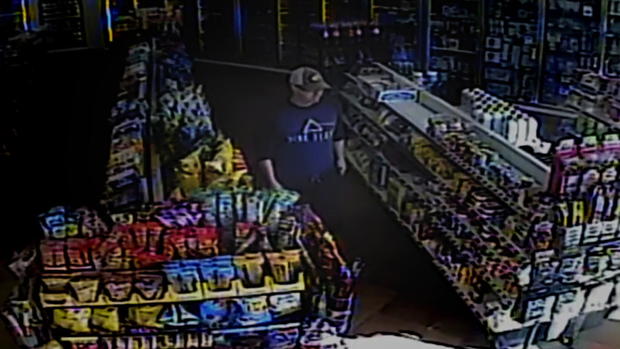
Simultaneously, Seth was captured on a camera next door, in a convenience store.
Da Wright Barksdale (in the convenience store with Green): You see him walk and he actually comes down, I believe this aisle and he walks, and he gets something to drink.
The video, says Barksdale, would become a crucial piece of evidence not because of what was purchased, but because of what Seth was wearing: a Pink Floyd T-shirt and black athletic pants. Nearly four hours later, when sheriff's deputies arrived at the Perrault home to investigate Amanda's death, Seth was wearing something else.
Sheriff Howard Sills: When we get there he is dressed in shorts and a dark T-shirt.
And the clothing Seth was wearing in the video?
DA Wright Barksdale: We found those … in the washing machine.

The clothing was dry and had clearly not been laundered, but there was that deputy who had reported that Seth smelled freshly washed, and there was that damp towel that was found on the closet floor.
Justin Kenney: Seth says … he took a bath.
Seth's attorney Justin Kenney says Seth did wash up at some point.
Justin Kenney: If you take a bath — you're gonna change clothes. …. there was no evidence that the washing machine had actually been turned on. … it looked like the washing machine … was being used as a — a laundry basket.
Only a tiny speck of blood was found on the backside of Perrault's pants, and a trace amount of gun powder residue was found on his left hand when tested.
Justin Kenney: They did it three hours later after … potential contamination from being … at the police station.
Amanda's hands were never tested—and the gun was never dusted for fingerprints. But Sills felt he now had enough evidence to make an arrest. Just two days after Amanda's shooting, now former Eatonton Police officer Seth Perrault, was taken into custody.
Alesha Johnson: Sheriff Sills called me and let me know that they were going to arrest him for her murder. And I … My whole family w — just was so relieved and — and happy that – that –
Angie Johnson: She was gettin' justice.
Alesha Johnson: Yes.
But before a grand jury could hear the evidence and decide if there was enough to go to trial, COVID shut down the courts. Seth would sit in jail for nearly nine months until that autopsy report was released by the medical examiner, declaring Amanda's death a suicide. Her decision was based primarily on the lack of gunpowder around the wound, which meant the gun would had to have been right up against Amanda's head when it went off — and there were no signs of a struggle.
Justin Kenney: Nobody is just going to allow somebody — to put a gun to their head and pull the trigger without putting up some sort of fight.
Sheriff Howard Sills: I was astounded. … First thing, I just called the DA. I said, "You're not — (laughs) you're not gonna believe this."
Anne-Marie Green: Did you think maybe you made a mistake?
DA Wright Barksdale: Absolutely not. … We're gonna take every bit of the evidence and try to piece this thing together.
But Justin Kenney did think the prosecution was making a mistake, and that the autopsy report was all the evidence needed to defend Seth Perrault.
Justin Kenney: I mean, it was — it seemed pretty open-and-shut to me.
THE TRIAL OF SETH PERRAULT
It was Nov. 3, 2020, and Seth Perrault, still unindicted, had been in jail for nearly nine months. When COVID restrictions finally eased, a grand jury was set to decide if there was enough evidence against him, to go to trial.
Sheriff Howard Sills: And you know the first thing I put up for that grand jury to see?
Anne-Marie Green: The crime scene pictures.
Sheriff Howard Sills: No, ma'am. … The autopsy report that said, "Suicide." … "Ladies and gentlemen … The state crime lab medical examiner says this was a suicide. Now, I'm gonna show you the evidence I found."
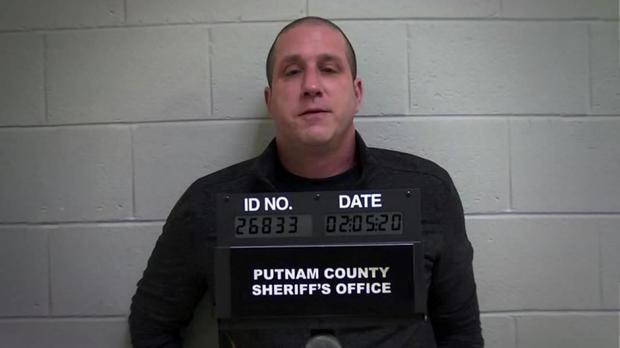
Members of the grand jury did see the crime scene photos and heard evidence of domestic abuse and quickly decided that, despite the medical examiner's report, Seth Perrault should face a jury of his peers.
Anne Marie Green: What were the charges?
DA Wright Barksdale: Malice murder … felony murder … and aggravated assault.
Perrault pleaded not guilty to all charges. At his trial in February 2022, he decided not to testify, leaving defense attorney Justin Kenney to tell his story.
Justin Kenney: I think there was a complete absence of sufficient evidence that Seth killed his wife.
The prosecution showed a jury of eight women and four men the crime scene photos, including the way Amanda's body and the gun were found. They also heard testimony from that sheriff's deputy who thought Seth smelled freshly showered. They watched the footage of Deputy Abernathy at the Perrault's front door and listened to all 60 minutes of Perrault's interview with Sheriff Sills.
SETH PERRAULT (to Sheriff Sills): I don't know how this happened.
District Attorney Barksdale says that some of the most compelling evidence was found on Amanda's cell phone. Like this video she recorded seven months prior to her death.
SETH PERRAULT: It's sad. It's sad because you know what, I married you and I'm — I'm not gonna — I'm — dude, you're done.
AMANDA PERRAULT: I'm done?
Amanda's sisters were seeing the video for the first time.
Alesha Johnson: It made me angry.
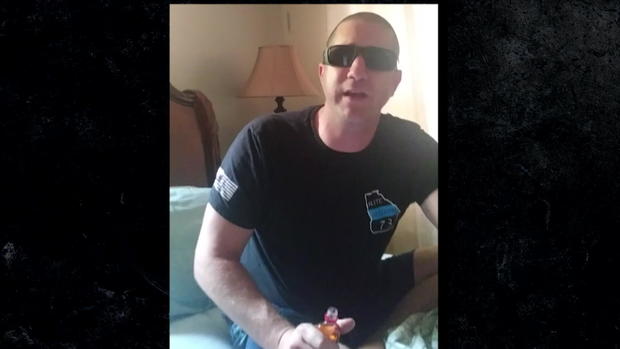
AMANDA PERRAULT: I wanna have a good weekend.
SETH PERRAULT: You burned that up when you tried to put that phone in my face.
AMANDA PERRAULT: What phone in your face?
SETH PERRAULT: Oh, right there. Oh, you're videotaping.
AMANDA: Yeah, because you're being a d*** and I'm gonna show you tomorrow.
SETH PERRAULT (yelling): Oh, so you didn't videotape all the s*** when you hit me and smacked me –
AMANDA PERRAULT (yelling): Hit you? You f****** choked me eight f****** times!
Justin Kenney: The video … was problematic. … But it — it doesn't show everything that took place … Seth also states that she had acted violently toward him as well.
There was no evidence of Seth having been abused introduced at trial. But Amanda's phone also contained photos of her with bruises, a black eye and a split lip along with texts like this one to her sisters: "Seth just choked me till I nearly passed out, busted my lip wide open."
Seth's then-8-year-old-daughter was interviewed by a forensic child psychologist. Remember, she was a witness to what happened the day Amanda called 911.
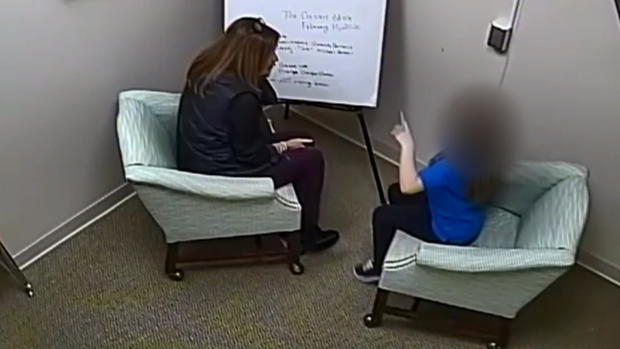
PERRAULT'S DAUGHTER: I was scared that, um, one of them might get hurt.
PERRAULT'S DAUGHTER: They were cussing at each other. … Miss Amanda was cussing too, but she didn't touch daddy at all. … Daddy was, like, touching her nose like this (demonstrates by pointing to her nose). Like, "Get out of my house right now."
The jury was shown most of the videotaped interview.
PERRAULT'S DAUGHTER: She was on the floor like this (gets on her knees) … tryin' to get her stuff. … then, all of a sudden, Daddy just started grabbing her arms. … and Daddy just pushed her over the laundry table. And then, um — opened the door … and pushed her out the door.
While her father spent the night in jail, she said Amanda begged her not to tell anyone what happened, or there could be deadly consequences.
DA Wright Barksdale: Amanda tells her that night, "If your daddy loses custody of you, he's going to shoot me dead."
PERRAULT'S DAUGHTER: "Your daddy would come shoot me dead."
But when Barksdale called the now-10-year-old to the witness stand, she said she couldn't recall what happened that day, or what she said in the interview.
Alesha Johnson: She, I think, felt really torn. I seen her look at her dad a couple times … And I felt like … she was more careful about what she was saying — like somebody had been coaching her.
In cross examination, the defense asked if anyone had coached her on what to say. She said no. But Justin Kenney says he believes another prosecution witness may have been coached: a jailhouse informant named Jack Faulk, who had shared a dorm block with Seth Perrault.
Justin Kenney: Jack Faulk has a criminal history, I believe 28 pages long. … numerous contacts with the police, and he had every incentive to lie, make up a story.
Faulk had come forward three weeks before the medical examiner's report was released, claiming he had valuable information about Amanda's death.
Sheriff Howard Sills: He knew things that only Seth Perrault could have told him.
In two hand-written letters, Faulk claimed that Seth told him, "The camera catching him with the clothes on was his biggest concern." He also claimed that Seth said, "He had been giving (Amanda) pain killers all day" and that "she was passed out" at the time of her death.
Sheriff Howard Sills: I think he was in the bed with her after she was passed out … and held the gun against her head.
Anne-Marie Green: He was behind her?
Sheriff Howard Sills: Behind her or slightly to the side.
The defense argued that Amanda shot herself because her lies about Seth assaulting her had potentially ruined their lives. Furthermore, only that tiny trace of gunshot residue was found on Perrault's left hand and there was just that one speck of blood found on his clothing.
Justin Kenney says the hardest thing for the defense to explain, was the way Amanda's body was found.
Justin Kenney: We knew that it was gonna be a problem. … the body had to be moved in some way. Had to be touched in some way.
Kenney says there is one explanation that makes sense to him; something Seth Perrault said in his interview with Sheriff Sills.
SETH PERRAULT (to Sheriff Sills): I probably did touch her. I was probably huggin' the s*** out of her.
Justin Kenney: And that would potentially account for her arms being, ah, by her sides.
As for the way Seth's gun was found beside Amanda's body with the ejected magazine by her side, the defense hired an expert who testified that he fired the gun six times and after one of those firings, the magazine spontaneously ejected.
Justin Kenney: It shows that that firearm can drop the magazine when it's fired.
DA Wright Barksdale: Howard Sills took that very gun out and shot it several times. The GBI examined that gun, didn't notate in their report any malfunctions whatsoever.
Then there was the medical examiner, Dr. Lora Darrisaw. Barksdale called her to the stand and asked her to explain how she came to her conclusion of suicide as the manner of death.
DA Wright Barksdale: What I wanted the jury and for her to see … she did not consider all the evidence. … She had not considered Seth's daughter's interview. She had not considered the cell phone data, the prior domestic abuse.
SETH PERRAULT (cell phone video): Oh, so you didn't — you didn't video tape all the s*** …
But Dr. Darrisaw defended her conclusion. And in this statement to "48 Hours," the Georgia Bureau of Investigation backed her up: "Our agency stands behind the original expert opinion of Perrault's death."
Anne-Marie Green: Were you worried at all about the verdict?
DA Wright Barksdale: What I try … and remind myself, it is my job to pursue justice and to present a case for the jury to consider. … And if they were to walk him out the door, I would be able to look to Amanda Perrault's family and say, "We did everything we could."
THE VERDICT
It had been just under two-and-a-half-hours, when the jury in the murder trial of Seth Perrault announced that they had reached a verdict.
Alesha Johnson: When they called us all back in, we all just held hands … And … dropped our head. I just remember praying, sayin', "God, you know, just please — you know, please do this for our family. … Let us have justice for our sister."
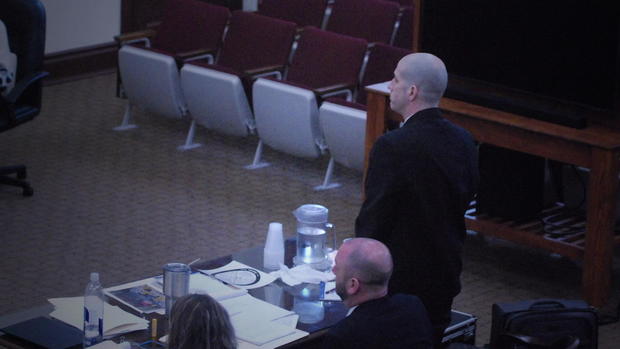
And justice is what they feel they got. The verdict: guilty of murder.
Alesha Johnson (emotional): It was bittersweet, because we got justice, but it didn't bring her back. It didn't bring our best friend back.
That same day, Perrault was sentenced to life, without the possibility of parole.
Alesha Johnson: I want many years of him prayin' to God, and bein' on his knees that he woulda took his own life instead of my sister's.
Justin Kenney says he believes an innocent man is now behind bars, for life.
Justin Kenney: My heart sank. … I've known Seth for almost a decade now, and … I don't think he did it.
Every August, on her birthday, Amanda's sisters honor her memory by releasing love letters tied to purple balloons.
Angie Johnson: "I love you Amanda, and I hope you are having a beautiful birthday in heaven."
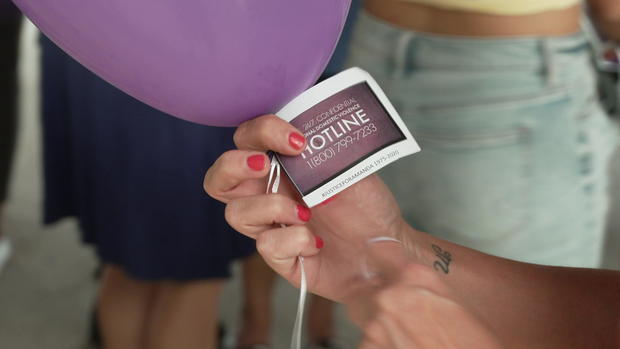
In 2022, the notes also included the National Domestic Abuse Hotline number.
Angie Johnson: And hopefully this will find somebody that really needs it.
Alesha Johnson: We just wanna create … awareness around domestic abuse. And for people to — don't sit back and just let it happen, no matter what the — the victim is telling you. Fight for them, you know? Help them. Help them any way you can. There's so many things I wish I could go back now and do different (cries). I wish I could go back and save her.
Anne-Marie Green: You're gonna save somebody with this.
Alesha Johnson: I hope so.
If you or someone you know is a victim of domestic abuse, call 1-800-799-SAFE or visit thehotline.org.
Seth Perrault's daughter is living with her mother, who has custody; his sister is petitioning to take custody.
"48 Hours" Post Mortem podcast
What happens when a toxic relationship turns deadly, especially at the hands of someone who is supposed to serve and protect? "48 Hours" contributor Anne-Marie Green and producer Judy Rybak discuss crossing the thin blue line, a questionable note left behind at the crime scene, the shocking report from the medical examiner ruling Amanda's death a suicide and if this would be enough to find Seth innocent at trial.
Produced by Judy Rybak. Michelle Sigona and Anthony Venditti are the development producers. Shaheen Tokhi is the field producer. Lauren Turner Dunn is the associate producer. Jud Johnston, Marcus Balsam, Marlon Disla and Wini Dini are the editors. Anthony Batson is the senior broadcast producer. Nancy Kramer is the executive story editor. Judy Tygard is the executive producer.
- In:
- 48 Hours
- Georgia
- Murder
- Domestic Violence
Disclaimer: The copyright of this article belongs to the original author. Reposting this article is solely for the purpose of information dissemination and does not constitute any investment advice. If there is any infringement, please contact us immediately. We will make corrections or deletions as necessary. Thank you.





